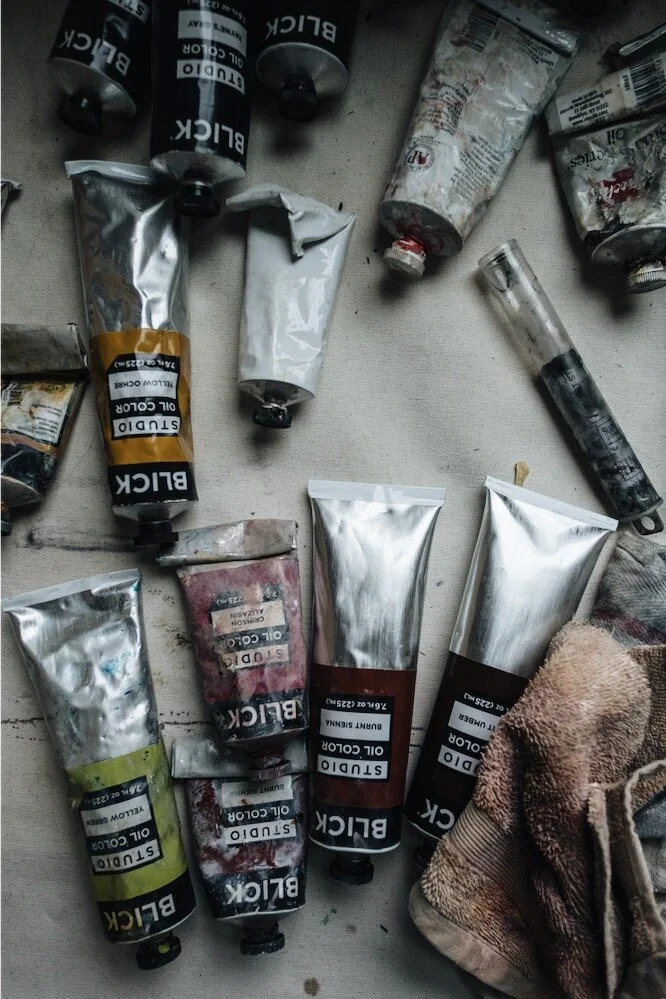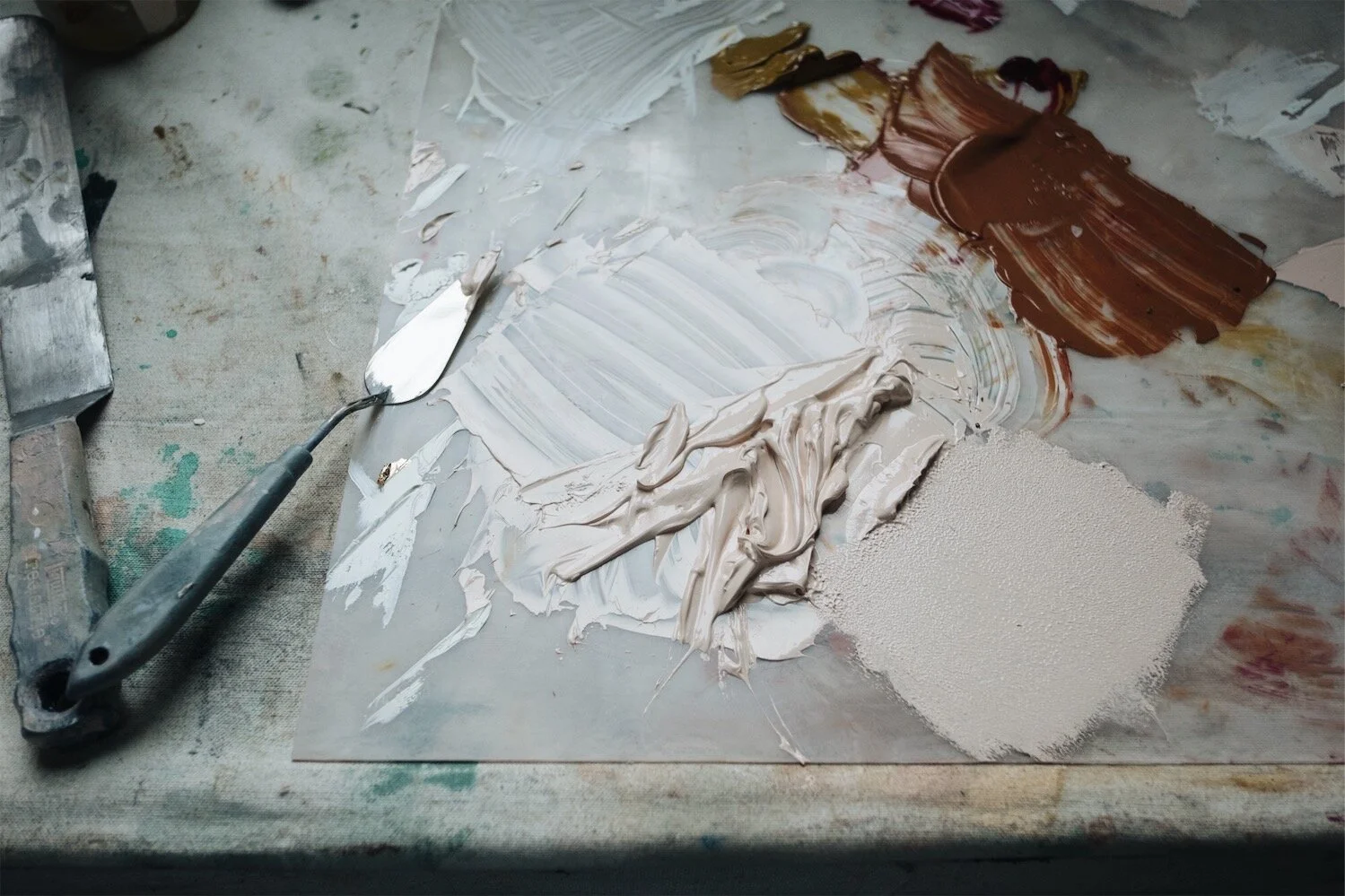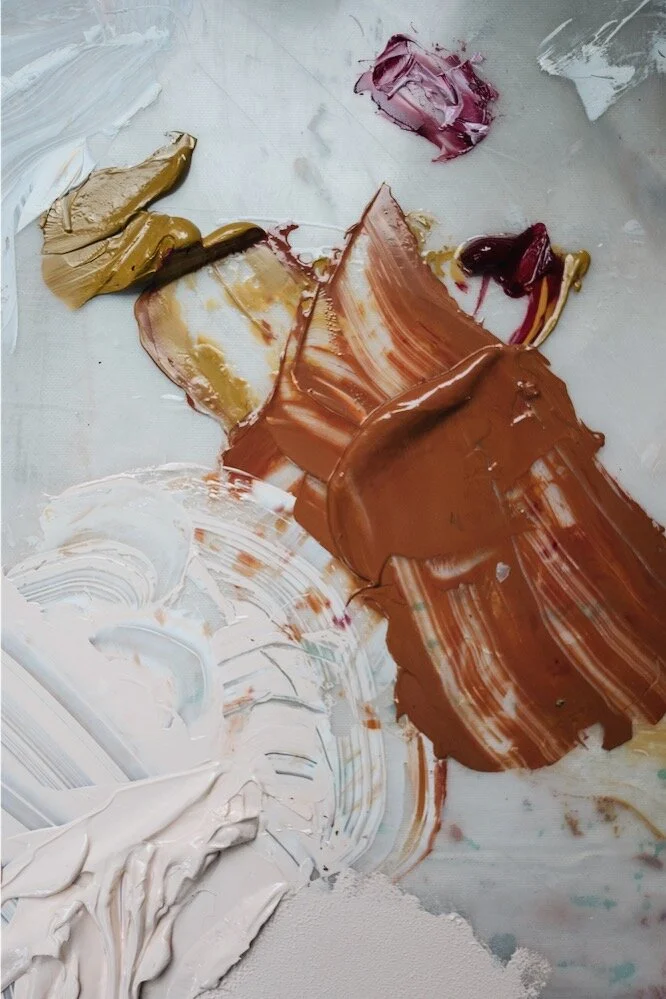Perfectionism Is The New Machismo
Painting: Portia Snow
All of us, male or female or on the full spectrum of gender, have both masculine and feminine traits and sensibilities. For me, it has always been about bringing these two qualities into balance within myself. The work has been to soften an inner masculine tyrant (the voice that says I’m never enough and I need to hustle more), and to recognize and value the strength of a beautiful, chaotic, and intuitive feminine inner seer (the fierce yet patient heart that calls to me to listen, observe, and commit to the depths of my own knowing).
Balance in this asymmetrical universe is not about equal parts--it’s about knowing when and where to tip the scales to keep things in motion, in flow, and fluid. Sometimes life calls for the masculine to step forward: to speak up, to focus and make a linear plan, to be a structural support for our family, to show up and use our strength to make something happen. At other times, life will insist that we slow down, unplug, tend to our roots, nourish our souls, listen to our intuition and tap into the unseen of the imagination, to trust in the dark, and sharpen the senses of the flesh. This is a dance when sometimes the the feminine twirls and turns us round or the masculine helps us find our footing.
Perfectionism stops the dance. Cold and lifeless. It is brittle and unyielding. We will break in the pursuit of perfection. It is predictable, and thus, boring. Where is the surprise in perfection? How else do we write our own resonant song that will attract the unexpected wonders of our heart’s deepest desires? This dance between the masculine and the feminine unlocks our relationship of discovery to the universe. Perfectionism keeps us smug wallflowers at the dance of life.
Perfectionism is the tyrannical male within telling us that we are not enough--that it is never enough.
Perfectionism is neither masculine nor feminine. Maureen Murdock explains in her book, The Heroine’s Journey:
“When [the masculine] becomes unbalanced and unrelated to life it becomes combative, critical, and destructive. This unrelated archetypal masculine can be cold and inhuman; it does not take into account our human limitations. Its machismo tells us to forge ahead no matter what the cost. It demands perfection, control, and domination; nothing is ever enough. Our masculine nature...is wounded.
“We must open our eyes and expand our consciousness. We need the moist, juicy, green, caring feminine to heal the wounded, dry, brittle, overextended masculine in our culture. Otherwise we inhabit a wasteland.”
Perfectionism fears the messiness of risk, of intimacy, of forging new paths that no equation can predict where you’ll end up and in what condition. Perfectionism will keep you weak and reliant on old ways. Risk will make you stronger, not brittle, but flexible and able to dance with whatever and whomever you meet along that path you’re forging--a path that no guide but yourself can take you on and through and to the top of the mountain peak.
Perfectionism limits perspective. We get so focused on specific outcomes, and our attention is captive to one way only. When we let go of perfection, our attention is free to see opportunities and grow in compassion and invention.
Perfectionism is armor covering up our fear. It’s not real--it’s theater. The thing with armor is that it keeps everything out, including real joy. If you spend your whole life preventing heartbreak, where will the light ever get in?
Perfectionism is control, which is one of our favorite false gods. And when it all comes crashing down, we break, and feel resilience is practically impossible. This is the mask of machismo. Machismo flexes its muscles and has everything under control. Machismo has all the answers; so does perfectionism. Machismo says if you march to the beat of your own drum, you are other and deserve ridicule; perfectionism is dangerously more subtle with its judgements. We say to others, “you must have done it wrong if you didn’t do it like I did.”
Perfectionism is a performance, not a dance. Like machismo, we can do no wrong--we have polished every step, every word, every move. We are afraid when someone else deviates from the choreography. We have no idea what to do when someone begins to improvise. When we are addicted to perfectionism, we cannot pivot with agility and joy. We panic. We freeze. And we point our finger at the person who ruined the entire performance.
Growth happens when we expose ourselves to our deepest vulnerabilities. When we believe the inner perfectionist we become static and sterile, unable to empathize or cultivate compassion. We stand on the sidelines of growth, judging everyone else for taking risks, for deviating from the rule book, as they courageously tread through the messiness of real life.
Perfectionism keeps us small so we can fit within the box we came to believe we must fit inside--all cramped up, with so little air, we’re somehow proud that we’re fitting inside the box. I realize now there is no box I will fit inside, even if I follow the rule book. I’ve tried. A few times. Thank goodness I never fit in any of the boxes, and now I get to be as expansive as the dark matter that quietly holds us together in this universal dance.
The truly most heartbreaking reality of perfectionism is that it keeps love at a very long distance. When we deny our limits as humans, we build a fortress around us so that no one will see inside to sneer at our wounds, our faults, or our strange behaviors. Or so we think they will sneer. When we allow ourselves to hide within the kingdom of perfectionism, we assume everyone is a threat and will be just as critical of us as we are to ourselves.
I believe in humanity. Most of us are lovers. Not critics.
The truth is, most of life is feminine. It’s quiet and ordinary in its commonness. It’s everywhere, though we cannot see it. Most days are about gestation and slow growth full of questions that will not have answers. The mystery leads us on in the dance. For brief and powerful moments something or someone will reveal itself to us, and all will be clear and bright--this is the masculine of heart. Our imagination will remember and reshape these moments of clarity--we keep our eyes and our ears open, paying attention in hopes the revelation will come again. Gestation. In the dark we are forming. Most days, we are ordinary as part of some unseen web of beautiful chaos.
To break our addiction with perfectionism, we must practice making space for good enough. We will disappoint people, make others uncomfortable, and even feel embarrassed. Our pride must be willing to be wounded on the frontlines of exposure. We might as well laugh at ourselves as we learn a completely new dance that has nothing to do with doing it right, and, most of the time, we will not die from our wounds.
I once heard an interview with Yo Yo Ma, the renowned cellist, where he expressed his relief during a performance when he finally made the first mistake of the evening. Only then could he be free from the fear of performance, and he could actually let his heart take over his movement through the music. May we find freedom, satisfaction, and courage from our errors, mistakes, and shortcomings.
From Jorie Graham’s poem, Self-Portrait As The Gesture Between Them (Adam and Eve)
27
the feeling of being a digression not the link in the argument,
a new direction, an offshoot, the limb going on elsewhere,
28
and liking that error, a feeling of being capable because of an error,
29
of being wrong perhaps altogether wrong a piece from another set
30
stripped of position stripped of true function
31
and loving that error, loving that filial form, that break from perfection
32
where the complex mechanism fails, where the stranger appears in the clearing.
33
out of nowhere and uncalled for, out of nowhere to share the day.
Painting: Portia Snow
Paints: Portia Snow






